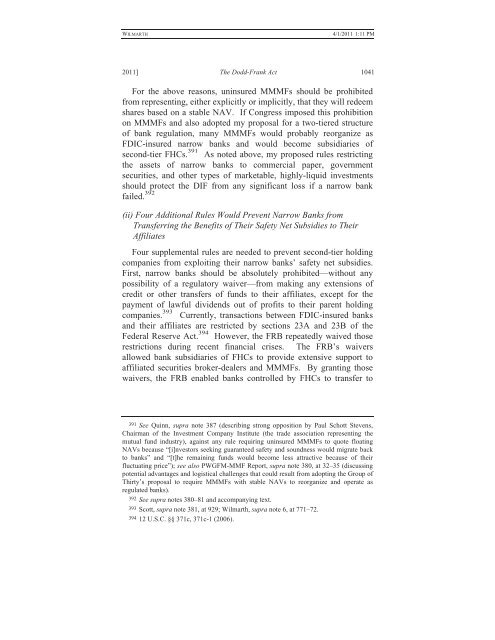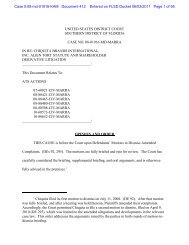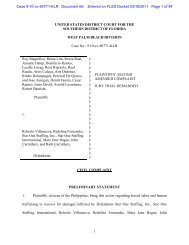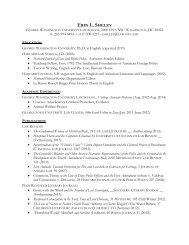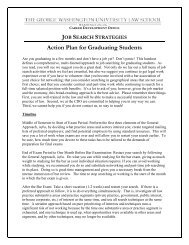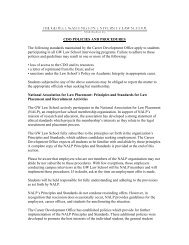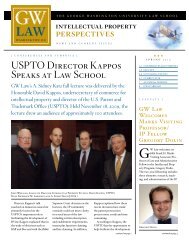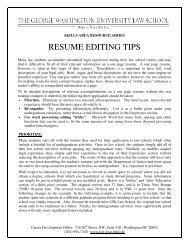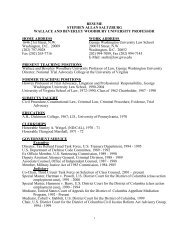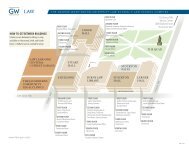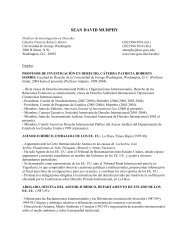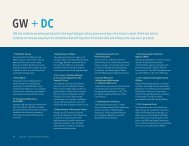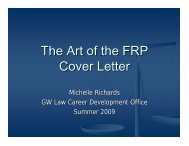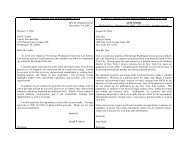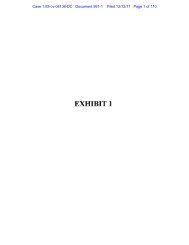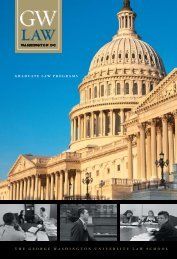CLE Materials for Panel #1 - George Washington University Law ...
CLE Materials for Panel #1 - George Washington University Law ...
CLE Materials for Panel #1 - George Washington University Law ...
You also want an ePaper? Increase the reach of your titles
YUMPU automatically turns print PDFs into web optimized ePapers that Google loves.
WILMARTH<br />
4/1/2011 1:11 PM<br />
2011] The Dodd-Frank Act 1041<br />
For the above reasons, uninsured MMMFs should be prohibited<br />
from representing, either explicitly or implicitly, that they will redeem<br />
shares based on a stable NAV. If Congress imposed this prohibition<br />
on MMMFs and also adopted my proposal <strong>for</strong> a two-tiered structure<br />
of bank regulation, many MMMFs would probably reorganize as<br />
FDIC-insured narrow banks and would become subsidiaries of<br />
second-tier FHCs. 391 As noted above, my proposed rules restricting<br />
the assets of narrow banks to commercial paper, government<br />
securities, and other types of marketable, highly-liquid investments<br />
should protect the DIF from any significant loss if a narrow bank<br />
failed. 392<br />
(ii) Four Additional Rules Would Prevent Narrow Banks from<br />
Transferring the Benefits of Their Safety Net Subsidies to Their<br />
Affiliates<br />
Four supplemental rules are needed to prevent second-tier holding<br />
companies from exploiting their narrow banks’ safety net subsidies.<br />
First, narrow banks should be absolutely prohibited—without any<br />
possibility of a regulatory waiver—from making any extensions of<br />
credit or other transfers of funds to their affiliates, except <strong>for</strong> the<br />
payment of lawful dividends out of profits to their parent holding<br />
companies. 393 Currently, transactions between FDIC-insured banks<br />
and their affiliates are restricted by sections 23A and 23B of the<br />
Federal Reserve Act. 394 However, the FRB repeatedly waived those<br />
restrictions during recent financial crises. The FRB’s waivers<br />
allowed bank subsidiaries of FHCs to provide extensive support to<br />
affiliated securities broker-dealers and MMMFs. By granting those<br />
waivers, the FRB enabled banks controlled by FHCs to transfer to<br />
391 See Quinn, supra note 387 (describing strong opposition by Paul Schott Stevens,<br />
Chairman of the Investment Company Institute (the trade association representing the<br />
mutual fund industry), against any rule requiring uninsured MMMFs to quote floating<br />
NAVs because “[i]nvestors seeking guaranteed safety and soundness would migrate back<br />
to banks” and “[t]he remaining funds would become less attractive because of their<br />
fluctuating price”); see also PWGFM-MMF Report, supra note 380, at 32–35 (discussing<br />
potential advantages and logistical challenges that could result from adopting the Group of<br />
Thirty’s proposal to require MMMFs with stable NAVs to reorganize and operate as<br />
regulated banks).<br />
392 See supra notes 380–81 and accompanying text.<br />
393 Scott, supra note 381, at 929; Wilmarth, supra note 6, at 771–72.<br />
394 12 U.S.C. §§ 371c, 371c-1 (2006).


